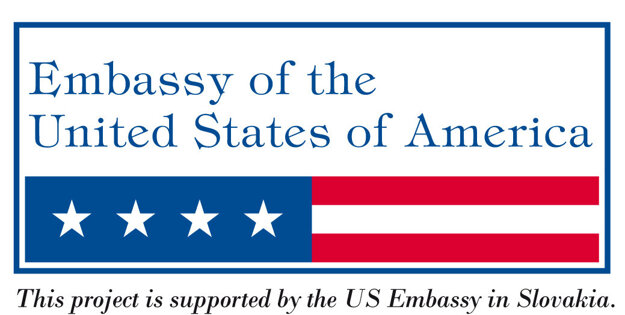A glossary of words is also published online.
During the pandemic, one thing that many Slovak businesses have found is easy to say, but much harder to actually do, is: “Don’t give in, no matter what.”
Zita Hosszúová is one of them. In 2011, at the age of 30, she became manager of the newly-established Bratislava cinema Lumière. Nine years later, she was facing another challenge. In April 2020, as the Covid-19 pandemic was shutting entertainment venues across the country, she and her colleagues launched Lumière’s virtual cinema ‘Online Kino Doma’.
“At the time, it was the only way for us to ‘survive’,” said Hosszúová, who does not see online cinema as an innovation in cinema operation as such. “Online screenings organised by cinemas are a crazy idea in reaction to an unusual situation.”
“Productivity and efficiency only flourish when a whole team can sit together and solve tasks ‘face-to-face’. Thankfully, that’s now possible.
„
On average, 50 people per showing paid a fee to enter her virtual cinema and watch films or listen to talks by film makers during the various lockdowns imposed during the pandemic.
Some may wonder if this ‘crazy idea’ was worth it in the age of streaming services. But Hosszúová said her ambition was never to compete with the likes of Netflix and similar platforms.
“Online Kino Doma was [set up] to keep people in the habit of ‘going to the cinema’,” explained Hosszúová, adding that she plans to close the service once the pandemic ends.
Deliveries rescue bistros
But cinemas have not, of course, been the only businesses suffering over the last two years. Coronavirus restrictions and chaos around delayed government financial assistance for some sectors, have caused serious problems for restaurants, too. By June 2020 alone, just a few months after the pandemic began, hundreds of pubs and restaurants had been put up for sale.
Restaurant co-owner Lucia Huong Šimeková, who featured in Forbes’ 30 Under 30 Class of 2020 in Slovakia, spent the first days and weeks of the pandemic doing calculations.
“My first thoughts were about how much of a financial reserve we had and how we were going to pay our staff,” the entrepreneur said.
The government ordered all services to halt their operations for the first time on March 13. Restaurants, including Huong Šimeková’s three Vietnamese bistros in Bratislava, called PHOčkáreň, were told they could no longer serve on site and were only allowed to sell meals to customers for pick-up – handing them over through a window.
“We started delivering meals. The first days were rough,” she recalled.
 Covid has failed to shut down student firms Read more
Covid has failed to shut down student firms Read more PHOčkáreň had to figure out the easiest way people could order food. Phones, WhatsApp, and a more sophisticated ordering system were all tried. “Over time, however, we worked out that external delivery companies would be more beneficial for us, and stopped doing our own deliveries,” she said.
Today, customers can order their food through Wolt, Bolt Food, and the Bistro.sk and dones.to websites.
As with many other restaurants around the country, during lockdowns, when curfews were in force, deliveries were of prime importance to PHOčkáreň.
In 2020, the firm recorded profits of €88,000 – up from €27,000 the year before.
Huong Šimeková stressed that communication, internal and external, has been very important over the last few years.
“We found that no matter how big a pandemic or a crisis, it’s best to communicate openly with employees and that it was right to make taking care of them a priority,” she said, adding that she had enjoyed managing crisis situations during the pandemic.
To a large extent, thanks to their staff, the bistros have managed to make it through the last two years without serious harm, the entrepreneur added.
E-commerce boom
In 2020, ‘only’ 4,229 firms shut down, while 19,335 new companies were established in Slovakia, according to the Finstat.sk website.
Slovakia’s Young Entrepreneurs Association says that more than a thousand 18-year-old Slovaks – the youngest age at which someone can set up a business in Slovakia – established their own company in 2020.
Alexandra Šeligová, 26, and Lukáš Závody, 26, made the same decision and started their own business.
Inspired by a traditional recipe belonging to their grandparents, shortly before the pandemic began, the young couple set up a small firm, Ihličkovo, selling syrups and other products – including what they describe as a “love potion” - made from tree needles.
“We didn’t know how it would all pan out, but the pandemic has driven us miles forward,” the couple said.
In September 2020, Šeligová was one of five finalists at the Young Innovative Entrepreneur competition, organised by the Junior Chamber International Slovakia and Entrepreneurs Association of Slovakia.
The couple sell their goods at smaller stores offering bio products, but much of their business comes through their online shop.
Online retailing has grown in recent years in Slovakia - in 2018, there were 11,600 e-shops, but by late 2020 that number had risen to 14,300, according to Heureka.sk, an e-shop comparison website.
 Who are the most attractive employers in Slovakia? Read more
Who are the most attractive employers in Slovakia? Read more Meanwhile, Slovaks have gotten more used to online shopping. In 2018, they spent almost €1.13 billion on online purchases, but this had risen to €1.75 billion in 2021.
As for Ihličkovo, the couple say they are more than happy with how their business has been going.
The firm’s revenues stood at €18,826 in the second half of 2020 and even rising costs of input materials, such as honey, are not causing them any major concerns.
“Honestly, we never dreamt that our project would become a success so quickly,” they said.
Pandemic socialising
According to the Young Entrepreneurs Association, young people are among the leading innovators in the virtual reality and AI sectors, among others.
One case in point: A group of young Slovaks is working on Vivat Slovakia, a video game set in 1990s Bratislava.
Despite problems with pandemic lockdowns, quarantines, and a global computer chip shortage, the game is expected to be released in 2023 after the team behind it were given a €45,000 subsidy by the Slovak Arts Council last year and ongoing crowdfunding has provided around €30,000. They say they will need much more money to complete the project, though.
“With regards to game development, every day matters,” Vivat producer Roman Lipka said. One developer is very often dependent on the work completed by another, so if a person goes off work for a week, it creates a very serious problem.
Unlike Vivat Slovakia, the pandemic had little impact on the development of WHOO, a social app created by five Slovaks including YouTuber Exploited.
The idea occurred to Daniel Čačala, the founder of the DayByMe social network, in 2020 when he was unable to contact a person in the same room. The app, which shows a user other Instagram, TikTok and Snapchat users close to them, was launched just months later.
“We are getting more and more positive messages from people about new friendships and relationships as the app grows,” noted Čačala.
As people like Čačala have worked hard to overcome what seemed sometimes insurmountable obstacles to reaching customers during lockdowns over the last two years, many have welcomed the recent beginnings of what seems like a return to pre-pandemic working environments.
“Productivity and efficiency only flourish when a whole team can sit together and solve tasks ‘face-to-face’. Thankfully, that’s now possible,” he said.
The Spectator College is a programme designed to support the study and teaching of English in Slovakia, as well as to inspire interest in important public issues among young people.







